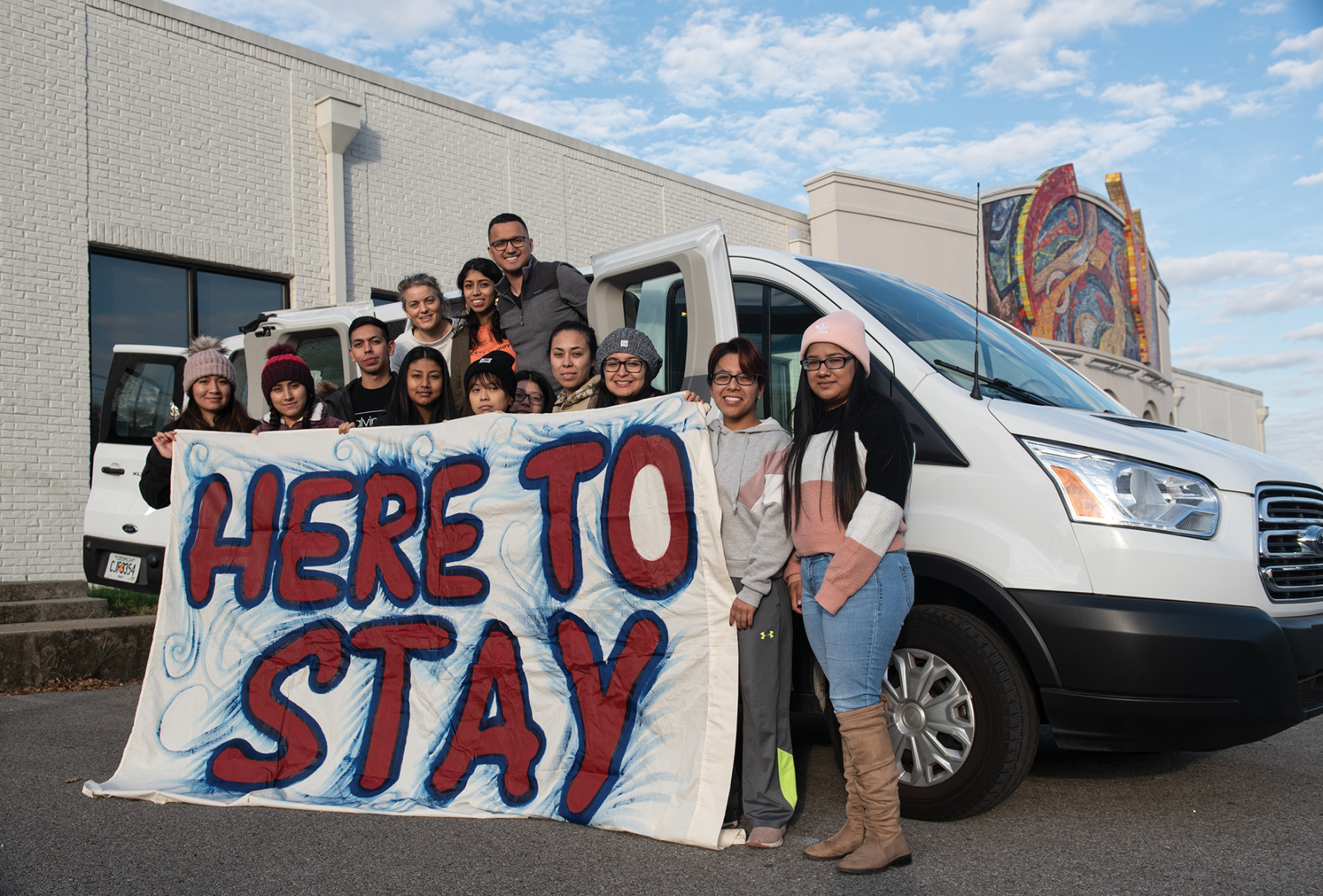Every year, the Nashville Scene editorial staff selects an individual or group as our Nashvillian or Nashvillians of the Year. This year, we’ve selected the staff of the Tennessee Immigrant and Refugee Rights Coalition, a group started in 2003 to empower and protect immigrants and refugees throughout the state. Last year, the coalition launched TIRRC Votes, an affiliated organization with the mission of electing pro-immigrant officials. See details on the Scene's past Nashvillians of the Year here.

Co-executive directors Stephanie Teatro and Lindsey Harris with some of the TIRRC staff
Dulce Castro was celebrating her 20th birthday on a weekend in July when she got a call around 10 p.m. It was the son of a man who had been arrested in Jackson, Tenn. He needed help finding his father.
Though she admits to feeling pressure from the responsibility, Castro had been trained for moments like these. She manages the Tennessee Immigrant and Refugee Rights Coalition’s hotline on alternating nights and weekends, taking calls from distressed Tennesseans whose family members or other loved ones have been detained by federal immigration authorities.
The fear and confusion felt by the callers are familiar to Castro, herself a recipient of Deferred Action for Childhood Arrivals, the Obama-era protections for undocumented people brought to the United States as children.
“I know how it feels to not be sure what’s going to happen to our family members,” Castro says. “I know what it feels like to have that fear, to have that anxiety. So I feel like I’m giving back to my community by helping others that are going through the same situation.”
Keeping to the script she and her fellow TIRRC hotline workers are given for these situations, Castro gathered as much information about the situation as the caller could give, told him about sympathetic lawyers in the area and alerted a deportation defense group. A team from TIRRC deployed to Jackson and started going door to door looking for witnesses. (Castro herself couldn’t go, in part because she had recently broken her toe, but she has gone on other TIRRC rapid-response trips this year.)
Eventually, the TIRRC team was able to identify the six people detained by Immigration and Customs Enforcement agents, who had been assisted by the Madison County Sheriff’s Office.
It was just one weekend in an otherwise busy year both for Castro and the immigrant and refugee advocacy group of which she is a member. When TIRRC sent a vanful of DACA recipients to Washington, D.C., for Supreme Court oral arguments about DACA, Castro secured one of the sought-after seats inside the high court chambers. When then-presidential candidate Beto O’Rourke came to Nashville he diligently took notes while Castro told him about immigrant wage theft as part of a roundtable organized by TIRRC’s political arm.
As President Trump’s first term in office nears its conclusion, TIRRC leaders hope they’re approaching the end of a difficult era.

Dulce Castro
Managing TIRRC’s hotline, meeting with a presidential candidate, attending oral arguments at the Supreme Court and keeping up with her college coursework apparently weren’t enough to keep Dulce Castro busy this year. She also volunteered for TIRRC Votes, the TIRRC-affiliated 501(c)(4) established in 2018 to allow for more direct political advocacy. With her broken toe, she was mostly unable to join TIRRC Votes canvassers as they worked all over the city during the summer ahead of the 2019 Metro elections. Castro did make calls and send text messages as part of the organization’s effort to elect a more pro-immigrant Metro Council.
Jacky Gomez, another TIRRC member, was able to knock on doors throughout the summer. The 24-year-old, like Castro, is not able to vote herself — she was undocumented until she was 19, when she gained residency status. But she wanted to help those who could, especially those less likely to vote.
“When a candidate is going to knock on doors, they have limited resources,” Gomez says. “They’re only going to go knock on the doors of folks who are more likely to vote, because they voted in the past and they likely voted the party of that candidate.”
But Gomez and the TIRRC Votes canvassers sought out a different group: immigrants, refugees, new Americans and those who told them that no one had ever asked for their vote. She spent much of her time walking the streets of Metro Council District 30 in the southeast part of Davidson County, where TIRRC Votes was backing the 26-year-old Sandra Sepulveda over former state Rep. Sherry Jones.
At one house, a voter seemed excited to be included, but Gomez noticed there was no vehicle. On Election Day, she drove the voter to the polls. At another house in a predominatly Muslim neighborhood, a woman was caught off guard by the random people knocking on her door, but Gomez’s canvassing partner offered an “As-Salaam-Alaikum,” quickly disarming the potential voter.
Sepulveda won, making her the first Latina on the council, and she in part credits the work of TIRRC volunteers (with whom she was prohibited from coordinating).
“You had people from TIRRC out there knocking, my team was out there knocking, and I feel like we had a lot of new first-time voters because of that,” Sepulveda says. “As I would be knocking on doors, people would tell me, ‘No one’s knocked on my door in 20 years.’ A lot of people felt forgotten.”
Twenty-one of TIRRC Votes’ 25 endorsed candidates in the 2019 Nashville elections won their races, a victory for the nascent group. TIRRC leaders hope the election of those “pro-immigrant champions” leads to more proactive immigrant and refugee protections at the local level. (An early victory for the group in the new term came when Sheriff Daron Hall, who was not up for re-election, announced he would end his office’s detention contract with ICE.)
TIRRC Votes is focused on local races for now, because its leaders see greater opportunity for on-the-ground impact in often-overlooked Metro Council and state legislative races. But the foray into political advocacy was in part inspired by the national political moment, and national political figures have taken note of TIRRC’s work.
Less than a month after O’Rourke visited with a group from TIRRC Votes, fellow Democratic presidential candidate Pete Buttigieg tapped TIRRC co-executive director Stephanie Teatro to kick off a campaign rally in Nashville. In 2018, the Democratic celebrities from Pod Save America chose Teatro as a guest for their live show at the Ryman.
TIRRC leaders predict the national attention is a harbinger of political change in the state.
“People recognize that basically, if you can win in the South, you’ll be able to win anywhere in the country,” says TIRRC policy director Lisa Sherman-Nikolaus.
“It’s not surprising that federal candidates, when they come to any state — and certainly the South, where a lot of anti-immigrant politics have found fertile ground — that they would want to address the issue,” adds Teatro.
And on that fertile ground, Tennessee’s immigrant advocates have had practice over the years in combating the kind of rhetoric and policies that have made their way upstream to Washington, D.C.
“In some ways, we were one of the organizations that was most prepared for the Trump administration, because a lot of the tactics that were being used by the Trump administration are things that have been tried here in Tennessee at the local level or at the state level,” Sherman-Nikolaus says.

A group of DACA recipients organized by TIRRC travels to Washington, D.C., for Supreme Court arguments
In the nearly two decades since legislation was passed in the state allowing undocumented immigrants to get driver’s licenses, Tennessee politics have undergone a transformation. Marsha Blackburn, then a state senator leading the charge against the policy, now holds one of Tennessee’s two U.S. Senate seats. Both chambers of the state legislature have swung from Democratic to Republican control. Most of TIRRC’s lobbying successes in the intervening years have involved making sure something they deem harmful doesn’t pass, rather than pushing something they like.
“We have had a lot of experience building power while in a defensive posture,” says Lindsey Harris, who along with Teatro serves as the organization’s co-executive director.
The addition of direct campaign advocacy and ICE rapid response to TIRRC’s responsibilities mostly followed Trump’s ascent, but the growth is also part of an arc extending back to the organization’s founding, shortly after the dawn of the new millennium. Immigrant advocates from around the state were descending on the state Capitol in Nashville to push for the law allowing undocumented residents to secure driver’s licenses.
The group was successful — though the law was eventually repealed — but the experience drew attention to the need for a more formalized coalition of advocates.
“The immigrant and refugee population in Tennessee started growing in significant ways in the ’90s, and so for a while it was a phenomenon that a lot of people weren’t aware of, and certainly it wasn’t being made into a political issue,” says David Lubell, TIRRC founder and former executive director. Lubell has since gone on to start Welcoming America and Welcoming International. “Starting in 2000, and certainly after Sept. 11, it became more of a political issue, and the rhetoric started getting worse.”
From his new home in Berlin, Lubell describes TIRRC’s expanding purview as “another step in a logical evolution,” but he heaps praise on co-executive directors Harris and Teatro for making it possible.
“It could be logical, but actually making these things happen is very difficult, and doing it well is even more difficult,” he says. “And they’re doing it in a way that the rest of the country is paying attention. The national and global winds will shift, and when those winds make their way to the South, make their way to Tennessee, that movement, that strength, that group of people and institutions around the state will be ready. They’ll be part of writing that next chapter for Tennessee.”
Harris and Teatro jointly applied for and received the top job in 2014, when the former was operations director and the latter policy director. The yin-and-yang leadership model allows them not to “lift up one facet of the work over the other,” as Harris puts it.
The work has taken on new meaning since the 2016 presidential election.
“Starting right after the election in 2016, we immediately started trying to prepare for what we thought would be the worst-case scenario, and have since 2017 been trying to build capacity and prepare communities for this moment,” Harris says. “It was hard, but we’ve been building toward this for a while, been trying to get ready for a year like this.”
Though the organization receives more than 5,000 calls per year, some — like the one Dulce Castro answered in July — are more urgent than others. One such call came in April 2018, when ICE arrested dozens of workers at a meatpacking plant in Morristown, east of Knoxville.
“It was the first time we had seen enforcement activity of that scale,” Harris recalls. TIRRC staff, volunteers and board members quickly sprang into action.
The work has ramped up since Trump’s election, but their busy 2019 is not exactly an anomaly. People are just paying attention now, Teatro says.
“Communities have been terrorized by ICE, families have been separated by ICE, collaboration between local governments and ICE has been problematic and exposed before,” she says. “That’s not what was new. People are paying more attention to the impact of immigration policy on local communities, but also I think people are no longer giving ICE the benefit of the doubt, and so there’s a new way of looking at what ICE is doing.”
Upon arriving on the ground in Morristown, TIRRC affiliates sought to identify the detained individuals and connect their families with legal help and other services first. Then they sought to communicate with local and national media outlets in order to “make sure everyone in the country understood what really happens, what that political rhetoric looks like in a community and the devastating impacts that it has,” as Harris puts it.
The Morristown raid was one of the most significant immigration enforcement actions in years, but earlier this year, federal authorities detained about six times as many immigrants in neighboring Mississippi. Even though that took place outside of Tennessee, TIRRC again leaped into action, sending volunteers, including Dulce Castro, and staff to Mississippi. Castro described it as “a humanitarian crisis.”

Rendering of TIRRC’s forthcoming headquarters
TIRRC’s capacity to respond in neighboring states illustrates the steady growth the organization has managed since 2016 — growth that has led to “something that’s so much stronger than anything we could have imagined way back then,” according to Lubell.
The growth both necessitates and allows for TIRRC’s latest development, the announcement of a capital campaign to build a stand-alone headquarters, after years of operating within Conexión Américas’ Casa Azafrán. TIRRC is planning to announce the capital campaign — of which attorney Anne Davis and her husband, former Mayor Karl Dean, are honorary co-chairs — at a Dec. 7 ceremony at the property, which is on Antioch Pike between Haywood Lane and Harding Place.
TIRRC studied Metro Nashville Public Schools data to find the neighborhood where its services would be most needed, and also made note of the relative dearth of nonprofits with a brick-and-mortar presence in Antioch.
“It’s the heart of the immigrant community — most families, fewest resources — so we knew that’s where we wanted to be,” Teatro says.
The 1.4-acre site will house community gardens, a soccer field, a playground and the TIRRC building itself, a warehouse-style structure with office space on the second floor and adaptable multi-use space on the ground floor. Teatro hopes it will be “a place where people can come gather” — for TIRRC candidate forums, legal services clinics and language classes, but also graduations and quinceañeras.
TIRRC leaders have envisioned a building of their own for a long time, but the real work of designing the campus, seeking permits and meeting other requirements has been underway for about six months. The group hopes to be moved in by late spring; the new space will come online as TIRRC is bursting at the seams.
According to Teatro, the group employed fewer than 10 staff members when it moved into the Conexión Américas space. Now TIRRC has 24 staff members and often more than a dozen interns crammed into the rooms.
“We’re falling all over each other,” she says.
But the construction of the new facility will mean more than elbow room.
“It’ll be done in 2020, hopefully as we near the end of the Trump presidency,” says Teatro. “And to be able to come out of this time with a monument not only to the kind of city we are, but also to show that immigrant families [and] immigrant communities are only putting down firmer and deeper roots. … It’s been so nice to be able to dream about that kind of future, to be able to work on something in this moment that is a better representation of the kind of community we want to be.”
TIRRC is announcing a capital campaign to build a stand-alone headquarters at a ceremonial groundbreaking at the Antioch Pike property on Dec. 7.

Co-executive directors Stephanie Teatro and Lindsey Harris with some of the TIRRC staff









